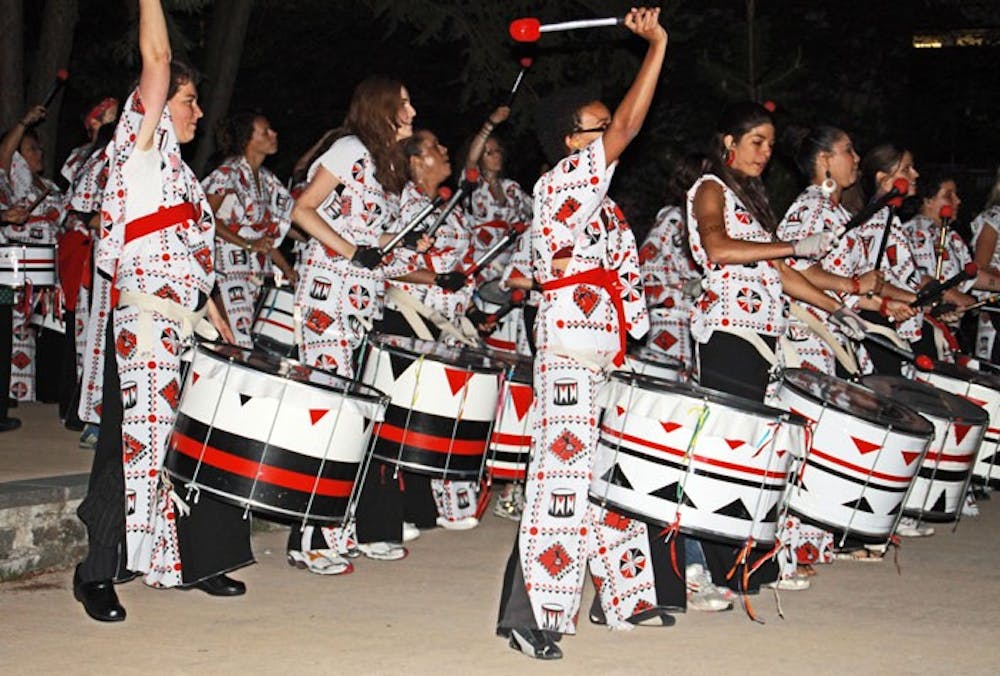A crowd of AU students and community members stormed campus Monday evening to make the night safer for women and men.
“We’ve got the power, we’ve got the might,” the marchers yelled above the sound of drumbeats and the rattling of maracas. “These streets are ours; take back the night!”
The group numbered about 400 people, according to Women’s Initiative Director Sarah Brown.
They gathered as part of Take Back the Night, an international event that started as impromptu rallies in communities frustrated by sexual assault, said Co-Director of the Stop Violence Against Women Department of Women’s Initiative and co-planner of the event Kyrie Bannar.
“The concept behind this event is that it’s a safe place for people,” Bannar said. “Yes, it’s a rally, and it’s loud, and it’s fantastic, but after that we get together and we talk about some really serious things ... things that really impact our community and that are overlooked every other day of the year here.”
For the first time in the event’s history at AU, the all-female percussion band Batala led the procession. They started the evening with a performance in the amphitheater that brought students out of their seats and up to the front to dance and play handheld instruments of their own.
Student Government President-elect Nate Bronstein joined the group of dancers when Batala took the stage. Bronstein said he first came to Take Back the Night in 2009, three days after his close friends experienced “some terrible things.” He said he was there to support his friends.
“I don’t want to have to worry about my daughter many years from now,” Bronstein said. “I don’t want her to have to carry around a can of mace when she goes outside. That’s why [this event] is important, because we need to come together in one movement and take back the night.”
The group marched from the amphitheater, through the tunnel, through the Letts-Anderson quad, past Letts Hall and over the main quad to the Kay Spiritual Life Center. AU’s all-female a cappella group Treble in Paradise performed on the steps of Kay before participants went inside to hear testimonials from victims of sexual violence and their allies. The testimonials lasted until 2:30 a.m. so every voice could be heard, according to Brown.
One student who shared her story at the testimonials told The Eagle that the first time she spoke at Take Back the Night three years ago, she had never really talked about the experience before. She said she spent the first three hours of the night certain she would not join the other speakers but felt compelled to add her story.
“It doesn’t even feel like you’re an individual standing up there telling your story,” the speaker said. “It feels like everyone else is right up there with you.”
WI hosted the event, but many other individuals and groups sponsored Take Back the Night, including President Neil Kerwin, the Department of Public Safety, each of the five schools within the university, the Counseling Center and the GLBTA Resource Center.
This was the seventh consecutive year hat WI hosted the event.
The AU community has taken steps forward and steps back in addressing the issues of rape and violence against women since 2004, according to WI Director Sarah Brown. Brown said she counted a recent column written by Eagle columnist Alex Knepper as one of those setbacks.
Jennifer Dorsey, co-director of the Stop Violence Against Women Department of Women’s Initiative with Bannar and co-planner of Take Back the Night, said she received mixed responses after the column was published. Some students were strengthened in their resolve to speak out at the event while others expressed fear.
Additionally, Brown said the Take Back the Night Facebook event received rape threats.
“There were people, AU students and non-AU students, threatening to rape participants in the rally, so that created this idea that Take Back the Night is not safe to go to, and that it’s not safe to tell your story at the testimonials,” Brown said. “We definitely considered that a setback.”
But Brown said AU is in the process of making advances in its sexual assault policy based on proposals put forward by a group of AU students, faculty and staff, including members of WI.
“The new [proposed] policy is very clear,” Brown said.
It will define consent in more detail than the old policy and allow those reporting crimes to file under terms like harassment or assault based on what fits their situation, according to Brown.
“There’s words in our policy that say sexual assault is a crime of power and control and there’s words in our policy that say that rape is never the responsibility of the survivor,” Brown said. “And to put language like that in a policy is actually pretty transformative.”
Brown said she expects the new sexual assault policy codes to be approved and implemented in the fall.
You can reach this staff writer at sparnass@theeagleonline.com.





